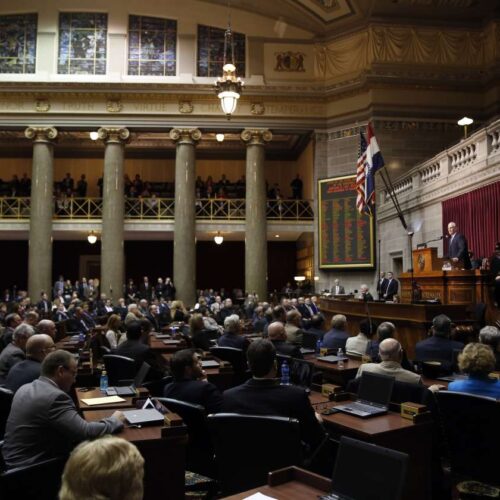Introduction
As state legislative sessions shift into high gear, lawmakers are proposing significant new ethics and transparency laws in nearly a dozen states, in part as a result of the Center’s State Integrity Investigation.
Many of these states have suffered recent statehouse scandals. But elected officials, advocates and editorial boards have also seized on the State Integrity Investigation report to argue for changes in how business is done in their capitals.
The State Integrity Investigation is a data-driven evaluation of state government accountability and transparency, published in November by the Center for Public Integrity and Global Integrity. The best score, a C, went to Alaska, while 11 states received failing grades.
The project found that in most states, ethics and open records laws are riddled with loopholes while the government agencies meant to enforce them are often toothless and underfunded. Many states that earned poor grades could see improvement if the new proposals are enacted. The barriers are significant, and calls for reform aren’t new, but the mood appears right in several states, where scandal and public outcry have put significant pressure on officials to act.
In Missouri, which has no limits on the size of campaign contributions or lobbyist gifts, a series of scandals has helped push several single-issue ethics bills through the Legislature. This week, the House passed a bill that would prohibit lawmakers from accepting gifts offered by lobbyists. The state earned a D- in the Center’s report, which spurred a long editorial from the St. Louis Post-Dispatch in November. Gov. Jay Nixon, a Democrat, has said that ethics reforms would be his top priority this year, his last in office. But despite the moves so far, Republicans in the legislature appear unlikely to advance broader reforms such as a cap on campaign contributions.
In New York, where successive rounds of ethics reforms in recent years have failed to slow a wave of prosecutions of public officials, Gov. Andrew Cuomo once again called for major changes to the state’s campaign finance and ethics laws. Last year, publication of the state’s D- grade came amid the convictions of the former speaker of the Assembly and former leader of the Senate in separate federal corruption trials. Both scandals and the Center’s report highlighted Albany’s infamous political culture, where many lawmakers earn substantial incomes working as private lawyers or consultants for some of the same industries that contribute millions of dollars to their political campaigns.
In his state of the state speech this month, Cuomo called for closing a major loophole in the state’s campaign finance law that allows for essentially unlimited contributions from corporate entities and also for a cap on lawmakers’ outside income. Many lawmakers have called for similar changes, but because of the nature of New York politics, the effort will likely live or die as part of budget negotiations later this year.
Reformers in other states may face longer odds. Lawmakers in Minnesota and Colorado and Washington’s attorney general have all cited their states’ grades in proposing bills that would make government more transparent and implement stronger conflicts-of-interest rules. The Minneapolis Star Tribune and The Seattle Times cited the State Integrity Investigation grades in editorials praising those efforts.
In Vermont, one of eight states without an independent ethics commission, Sen. Anthony Pollina introduced a bill to change that. The move is backed by Secretary of State Jim Condos, who has cited the state’s D- grade as evidence of the need for such a commission. But some lawmakers have questioned the costs associated with creating and staffing the commission and also whether the state constitution would even allow for it. Several scandals have helped build support for reforms, including an investigation into the state’s attorney general for allegedly violating campaign finance rules and the recent suspension of a senator who has been charged with sexually assaulting two women.
Lawmakers from both parties have also proposed creating an ethics commission in New Mexico, where former Secretary of State Dianna Duran recently completed a 30-day sentence after pleading guilty last year to stealing campaign funds. While Gov. Susana Martinez has not indicated whether she supports the move, she did recently call for improving campaign finance reporting and closing the revolving door between public office and lobbying. New Mexico earned an overall grade of D-, scoring failing grades in the categories of ethics enforcement agencies, political financing and legislative accountability. Earlier this month, the nonprofit news organization New Mexico In Depth published a special report on the new session focusing on transparency and accountability and drawing extensively on the State Integrity Investigation.
South Dakotans will not have to wait for their representatives to pass tougher laws. This month, the secretary of state approved a measure for this year’s ballot that would enact sweeping changes, including creating an independent ethics commission and limiting gifts from lobbyists. The measure is the result of a bipartisan campaign that was inspired by the state’s failing grade in the first State Integrity Investigation, published in 2012. After the state earned another F in November, the leaders of the ballot drive penned a column in the Argus Leader to build support for their campaign.
Nine states have yet to open their legislative sessions, while four do not meet for regular sessions at all this year, according to the National Conference of State Legislatures.


Join the conversation
Show Comments